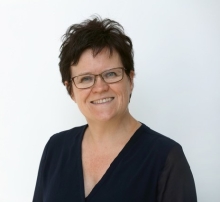CBE Special Seminar: N-Heterocyclic Carbenes - Self Assembled Monolayers, Nanoclusters and Catalysts for Enantioselective Cross Couplings

Allie Vi Douglas Distinguished Research Professor
Department of Chemistry
Queen’s University
Editor-in-Chief
ACS Catalysis
Abstract: The use of N-heterocyclic carbenes (NHCs) to modify homogeneous metal catalysts is widespread since the high metal-NHC bond strength renders high oxidative and chemical stability to the resulting metal complexes. The use of NHCs to modify metal surfaces has received considerably less attention. We will describe the modification of planar metallic surfaces with NHCs. The nature of the surface overlayer is strongly dependent on the nature of the NHC. Similarly, NHCs are useful new ligands for the stabilization of metal clusters, with the structure of the cluster being strongly influenced by the nature of the NHC. The unique properties of these NHC-stabilized clusters, including photophysical properties, stability and catalytic activity will be addressed. We will also describe advances in cross-coupling chemistry the preparation of complex chiral molecules of interest to the pharmaceutical industry. This will include the ability to cross-couple seemingly identical boron substituents with different electrophiles, taking advantage of inherent differences in transmetallation behaviour and the development of sulfones as novel electrophiles for Suzuki-Miyaura cross-coupling chemistry particularly in alkyl cross-coupling reactions.
Bio: Cathleen Crudden is the Allie Vi Douglas Distinguished Research Professor, Queen’s National Scholar and Tier 1 Canada Research Chair at Queen’s University, scientific director of the Carbon to Metal Coating Institute (C2MCI) and holds a cross appointment as a research professor at the Institute of Transformative Bio-Molecules (ITbM) in Nagoya, Japan. She received her doctorate in 1994 from the University of Ottawa with Howard Alper, and completed a postdoctoral fellowship at the University of Illinois, Urbana-Champaign with Scott Denmark before returning to Canada in 1996 as an assistant professor at the University of New Brunswick. She moved to Queen’s in 2002 as an associate professor before becoming full professor in 2010.
Her work in catalysis and materials has received significant acclaim, and recent work identifying a new class of carbon-based SAMs has been called "game changing" and "the new gold standard" by international experts.
Host: Professor Vojislav Stamenkovic
Share
Upcoming Events
-
CEE Ph.D. Defense Announcement: Machine Learning and Remote Sensing for Environmental Modeling - From Large-Scale Streamflow Forecasting to Malaria Risk Mapping
-
CBE Special Seminar: Operando Electrochemical Methods at Dynamic Energy Materials Interfaces
-
CEE Ph.D. Defense Announcement: Release, Transport and Fate of Per- and Polyfluoroalkyl Substances (PFAS) in Urban Watersheds
-
MSE 298 Seminar: Mechano-Electrochemical Phenomena at Ceramic Electrolyte Interfaces
-
MSE 298 Seminar: Innovation In Materials Science - An Industrial R&D Perspective
